Boardman J., Hammond N.G. L. The Cambridge Ancient History Volume 3, Part 3: The Expansion of the Greek World, Eighth to Sixth Centuries BC
Подождите немного. Документ загружается.

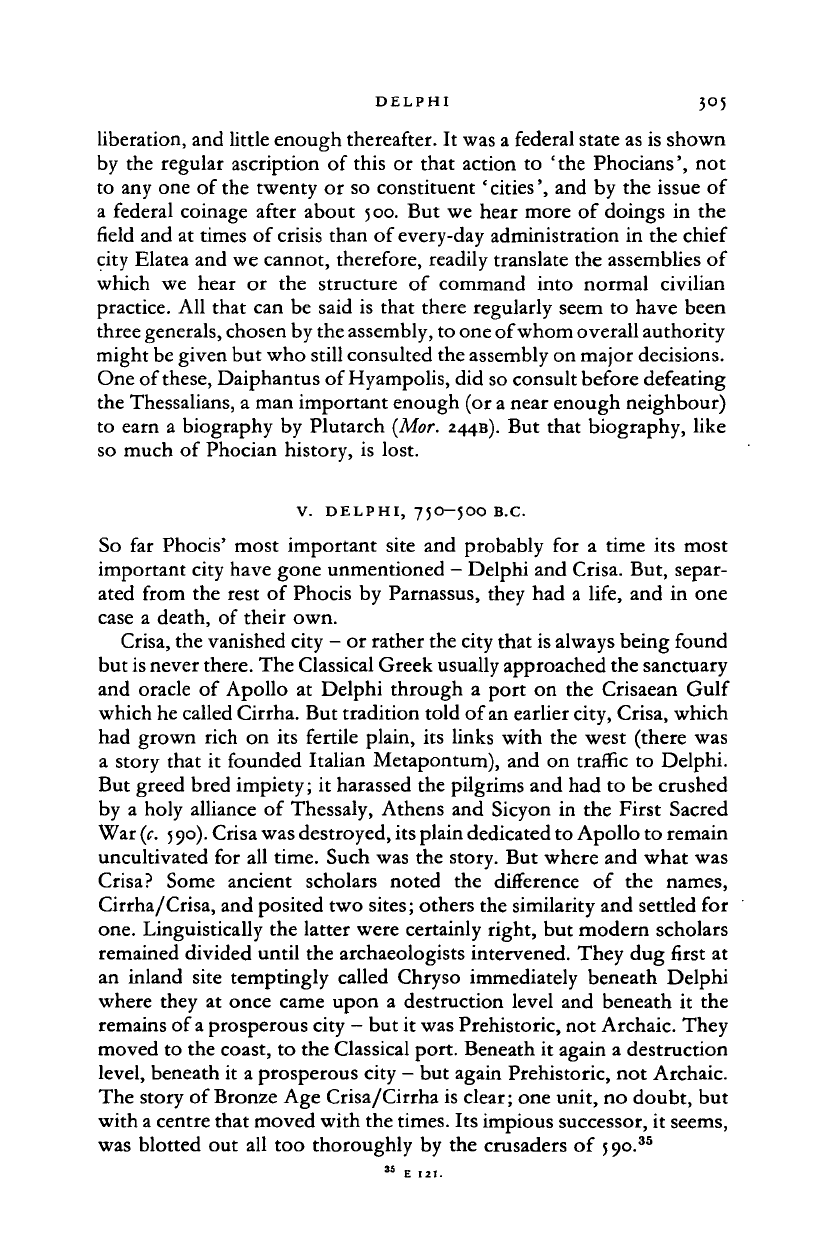
DELPHI
305
liberation, and little enough thereafter. It was a federal state as is shown
by the regular ascription of this or that action to
' the
Phocians', not
to any one of the twenty or so constituent '
cities',
and by the issue of
a federal coinage after about
5
00.
But we hear more of doings in the
field and at times of crisis than of every-day administration in the chief
city Elatea and we cannot, therefore, readily translate the assemblies of
which we hear or the structure of command into normal civilian
practice. All that can be said is that there regularly seem to have been
three
generals,
chosen by the assembly, to one of whom overall authority
might be given but who still consulted the assembly on major decisions.
One of these, Daiphantus of Hyampolis, did so consult before defeating
the Thessalians, a man important enough (or a near enough neighbour)
to earn a biography by Plutarch (Mor. 244B). But that biography, like
so much of Phocian history, is lost.
V. DELPHI, 75O—5OO B.C.
So far Phocis' most important site and probably for a time its most
important city have gone unmentioned
—
Delphi and Crisa. But, separ-
ated from the rest of Phocis by Parnassus, they had a life, and in one
case a death, of their own.
Crisa, the vanished city
—
or rather the city that is always being found
but is never
there.
The Classical Greek usually approached the sanctuary
and oracle of Apollo at Delphi through a port on the Crisaean Gulf
which he called Cirrha. But tradition told of an earlier city, Crisa, which
had grown rich on its fertile plain, its links with the west (there was
a story that it founded Italian Metapontum), and on traffic to Delphi.
But greed bred impiety; it harassed the pilgrims and had to be crushed
by a holy alliance of Thessaly, Athens and Sicyon in the First Sacred
War
(e.
5
90).
Crisa was destroyed, its plain dedicated to Apollo to remain
uncultivated for all time. Such was the story. But where and what was
Crisa? Some ancient scholars noted the difference of the names,
Cirrha/Crisa, and posited two sites; others the similarity and settled for
one.
Linguistically the latter were certainly right, but modern scholars
remained divided until the archaeologists intervened. They dug first at
an inland site temptingly called Chryso immediately beneath Delphi
where they at once came upon a destruction level and beneath it the
remains of
a
prosperous city - but it was Prehistoric, not Archaic. They
moved to the coast, to the Classical port. Beneath it again a destruction
level, beneath it a prosperous city - but again Prehistoric, not Archaic.
The story of Bronze Age Crisa/Cirrha is clear; one unit, no doubt, but
with a centre that moved with the times. Its impious successor, it seems,
was blotted out all too thoroughly by the crusaders of 590.
35
Cambridge Histories Online © Cambridge University Press, 2008
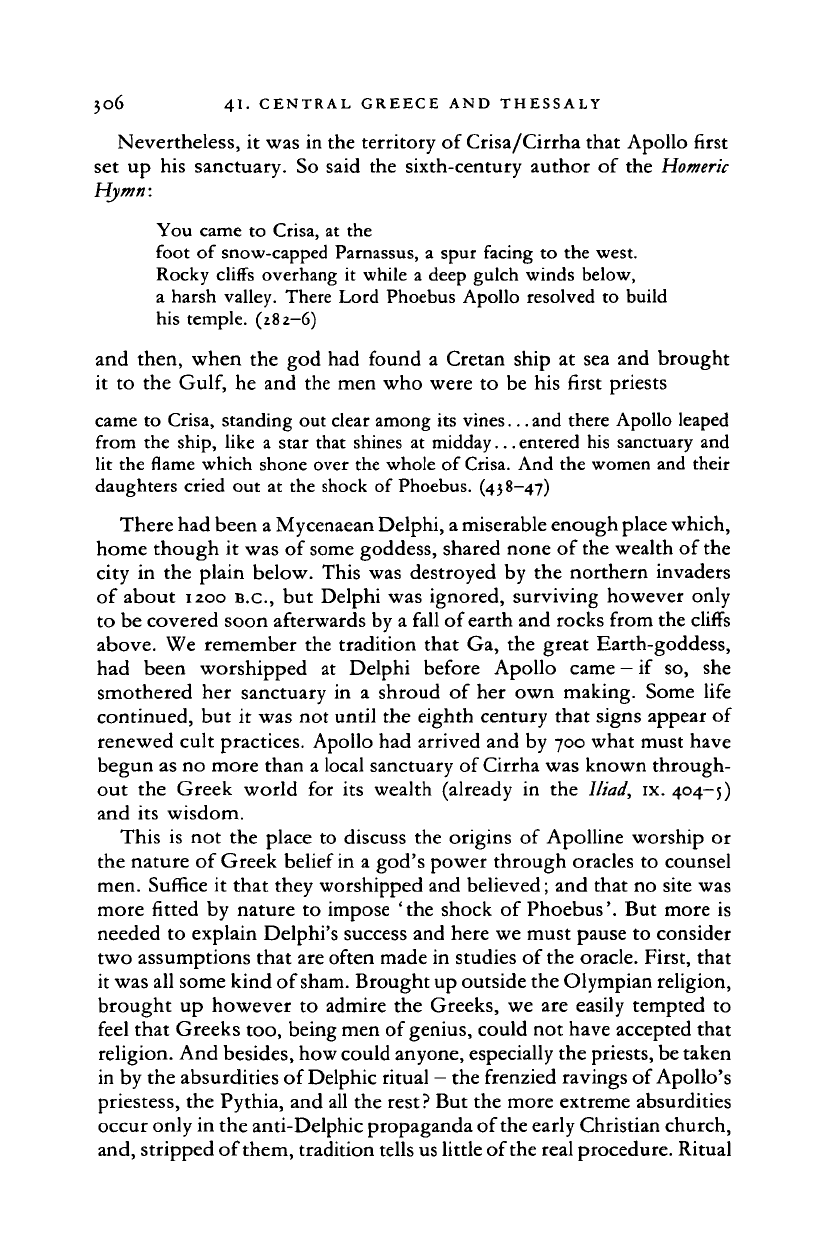
306 41. CENTRAL GREECE AND THESSALY
Nevertheless,
it
was in the territory of Crisa/Cirrha that Apollo first
set
up
his sanctuary. So said the sixth-century author
of
the
Homeric
Hymn:
You came to Crisa, at the
foot of snow-capped Parnassus, a spur facing to the west.
Rocky cliffs overhang
it
while a deep gulch winds below,
a harsh valley. There Lord Phoebus Apollo resolved to build
his temple. (282-6)
and then, when the god had found
a
Cretan ship
at
sea and brought
it
to
the
Gulf,
he
and the men who were
to
be his first priests
came to Crisa, standing out clear among its
vines...
and there Apollo leaped
from the ship, like
a
star that shines
at
midday... entered his sanctuary and
lit the
flame
which shone over the whole of
Crisa.
And the women and their
daughters cried out
at
the shock of Phoebus. (438—47)
There had been a Mycenaean Delphi, a miserable enough place which,
home though
it
was of some goddess, shared none of the wealth of the
city
in
the plain below. This was destroyed by the northern invaders
of about 1200 B.C., but Delphi was ignored, surviving however only
to be covered soon afterwards by a fall of earth and rocks from the cliffs
above. We remember the tradition that Ga, the great Earth-goddess,
had been worshipped
at
Delphi before Apollo came
—
if so, she
smothered
her
sanctuary
in a
shroud
of
her own making. Some life
continued, but
it
was not until the eighth century that signs appear of
renewed cult practices. Apollo had arrived and by 700 what must have
begun as no more than a local sanctuary of Cirrha was known through-
out
the
Greek world
for its
wealth (already
in the
Iliad,
ix. 404—5)
and its wisdom.
This
is
not the place
to
discuss the origins
of
Apolline worship
or
the nature of Greek belief in a god's power through oracles to counsel
men. Suffice
it
that they worshipped and believed; and that no site was
more fitted
by
nature
to
impose 'the shock
of
Phoebus'. But more
is
needed to explain Delphi's success and here we must pause to consider
two assumptions that are often made in studies of the oracle. First, that
it was all some kind of sham. Brought up outside the Olympian religion,
brought
up
however
to
admire the Greeks, we are easily tempted
to
feel that Greeks too, being men of
genius,
could not have accepted that
religion. And besides, how could anyone, especially the priests, be taken
in by the absurdities of Delphic ritual
—
the frenzied ravings of Apollo's
priestess, the Pythia, and all the rest? But the more extreme absurdities
occur only in the anti-Delphic propaganda of the early Christian church,
and, stripped of them, tradition tells us little of the real procedure. Ritual
Cambridge Histories Online © Cambridge University Press, 2008
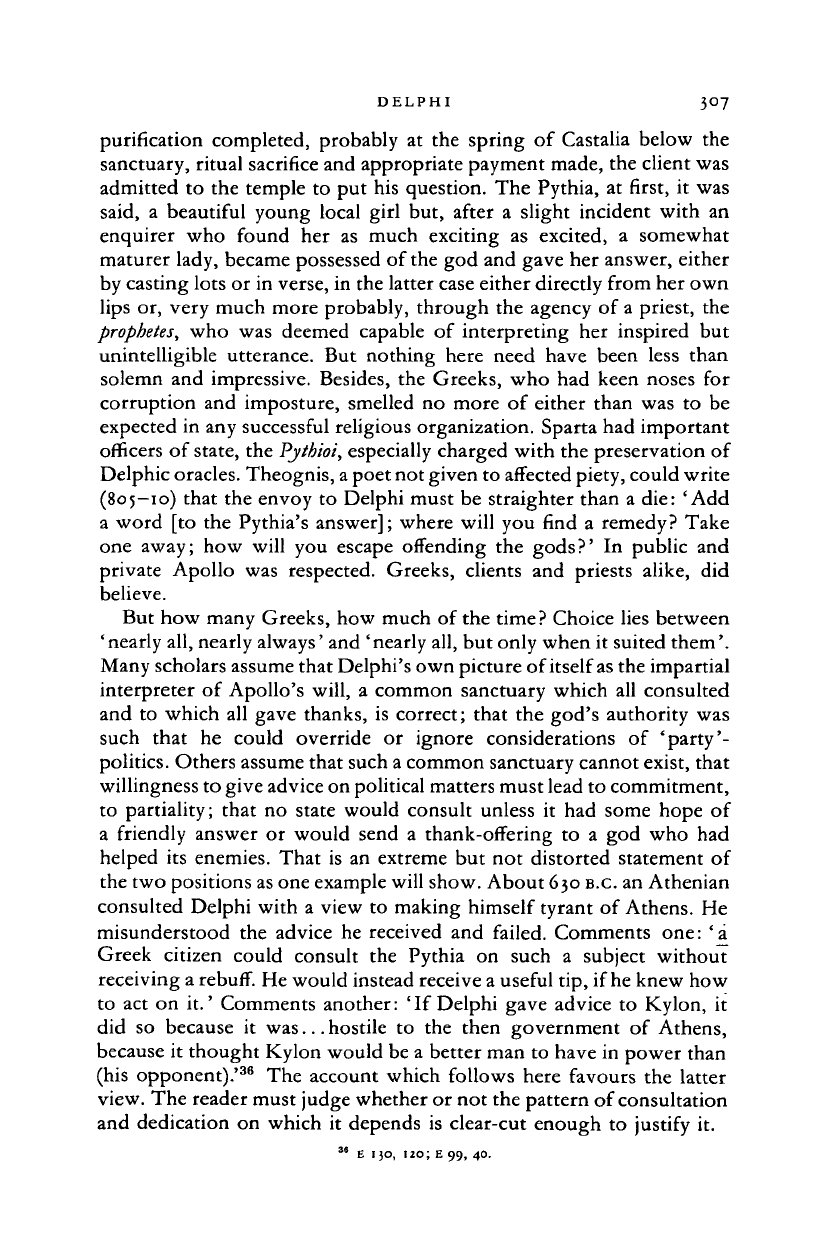
DELPHI
307
purification completed, probably at the spring of Castalia below the
sanctuary, ritual sacrifice and appropriate payment made, the client was
admitted to the temple to put his question. The Pythia, at first, it was
said, a beautiful young local girl but, after a slight incident with an
enquirer who found her as much exciting as excited, a somewhat
maturer lady, became possessed of the god and gave her answer, either
by casting lots or in verse, in the latter case either directly from her own
lips or, very much more probably, through the agency of a priest, the
prophetes,
who was deemed capable of interpreting her inspired but
unintelligible utterance. But nothing here need have been less than
solemn and impressive. Besides, the Greeks, who had keen noses for
corruption and imposture, smelled no more of either than was to be
expected in any successful religious organization. Sparta had important
officers of state, the
Pythioi,
especially charged with the preservation of
Delphic oracles. Theognis,
a
poet not given to affected piety, could write
(805-10) that the envoy to Delphi must be straighter than a die: 'Add
a word [to the Pythia's answer]; where will you find a remedy? Take
one away; how will you escape offending the gods?' In public and
private Apollo was respected. Greeks, clients and priests alike, did
believe.
But how many Greeks, how much of the time? Choice lies between
'nearly all, nearly always' and 'nearly all, but only when it suited them'.
Many scholars assume that Delphi's own picture of itself as the impartial
interpreter of Apollo's will, a common sanctuary which all consulted
and to which all gave thanks, is correct; that the god's authority was
such that he could override or ignore considerations of ' party'-
politics. Others assume that such a common sanctuary cannot exist, that
willingness to give advice on political matters must lead to commitment,
to partiality; that no state would consult unless it had some hope of
a friendly answer or would send a thank-offering to a god who had
helped its enemies. That is an extreme but not distorted statement of
the two positions as one example will show. About 630
B.C.
an Athenian
consulted Delphi with a view to making himself tyrant of Athens. He
misunderstood the advice he received and failed. Comments one: 'a
Greek citizen could consult the Pythia on such a subject without
receiving a
rebuff.
He would instead receive a useful tip, if he knew how
to act on it.' Comments another: 'If Delphi gave advice to Kylon, it
did so because it was... hostile to the then government of Athens,
because it thought Kylon would be a better man to have in power than
(his opponent).'
36
The account which follows here favours the latter
view. The reader must judge whether or not the pattern of consultation
and dedication on which it depends is clear-cut enough to justify it.
3e
E 130, I2O; E 99, 40.
Cambridge Histories Online © Cambridge University Press, 2008
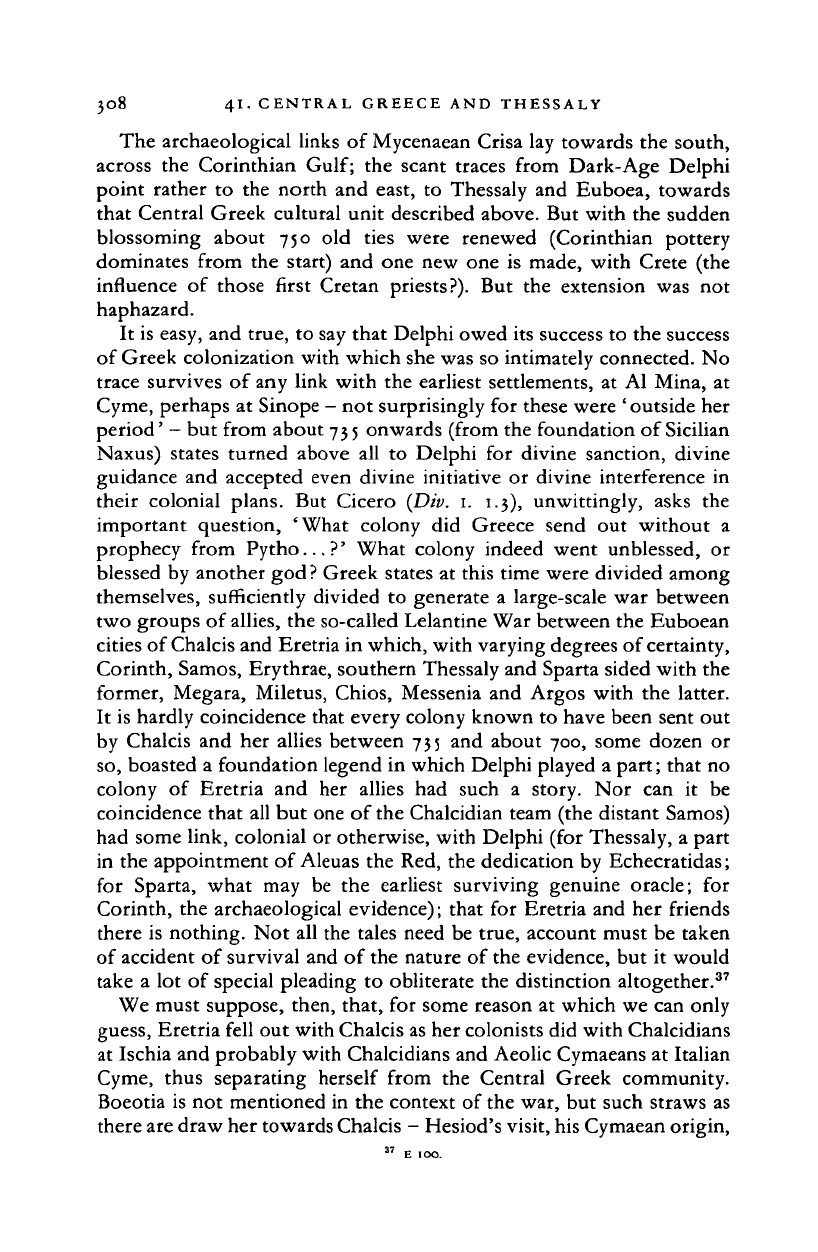
308 41. CENTRAL GREECE AND THESSALY
The archaeological links of Mycenaean Crisa lay towards the south,
across the Corinthian
Gulf;
the scant traces from Dark-Age Delphi
point rather
to
the north and east,
to
Thessaly and Euboea, towards
that Central Greek cultural unit described above. But with the sudden
blossoming about
750 old
ties were renewed (Corinthian pottery
dominates from the start) and one new one
is
made, with Crete (the
influence
of
those first Cretan priests?).
But the
extension was
not
haphazard.
It is easy, and true, to say that Delphi owed its success to the success
of Greek colonization with which she was so intimately connected. No
trace survives
of
any link with the earliest settlements,
at
Al Mina,
at
Cyme, perhaps at Sinope
-
not surprisingly for these were ' outside her
period'
—
but from about 735 onwards (from the foundation of Sicilian
Naxus) states turned above
all to
Delphi
for
divine sanction, divine
guidance and accepted even divine initiative
or
divine interference
in
their colonial plans.
But
Cicero (Div.
1. 1.3),
unwittingly, asks
the
important question, 'What colony
did
Greece send
out
without
a
prophecy from Pytho...?' What colony indeed went unblessed,
or
blessed by another god
?
Greek states at this time were divided among
themselves, sufficiently divided
to
generate
a
large-scale war between
two groups of
allies,
the so-called Lelantine War between the Euboean
cities of Chalcis and Eretria in which, with varying degrees of certainty,
Corinth, Samos, Erythrae, southern Thessaly and Sparta sided with the
former, Megara, Miletus, Chios, Messenia and Argos with the latter.
It is hardly coincidence that every colony known to have been sent out
by Chalcis and her allies between 735 and about 700, some dozen
or
so,
boasted a foundation legend in which Delphi played a part; that no
colony
of
Eretria
and her
allies
had
such
a
story.
Nor can it be
coincidence that all but one of the Chalcidian team (the distant Samos)
had some link, colonial or otherwise, with Delphi (for Thessaly, a part
in the appointment of Aleuas the Red, the dedication by Echecratidas;
for Sparta, what may
be the
earliest surviving genuine oracle;
for
Corinth, the archaeological evidence); that for Eretria and her friends
there is nothing. Not all the tales need be true, account must be taken
of accident
of
survival and of the nature of the evidence, but
it
would
take
a
lot
of
special pleading to obliterate the distinction altogether.
37
We must suppose, then, that, for some reason at which we can only
guess,
Eretria fell out with Chalcis as her colonists did with Chalcidians
at Ischia and probably with Chalcidians and Aeolic Cymaeans at Italian
Cyme, thus separating herself from
the
Central Greek community.
Boeotia is not mentioned in the context of the war, but such straws as
there are draw her towards Chalcis
-
Hesiod's visit, his Cymaean origin,
Cambridge Histories Online © Cambridge University Press, 2008
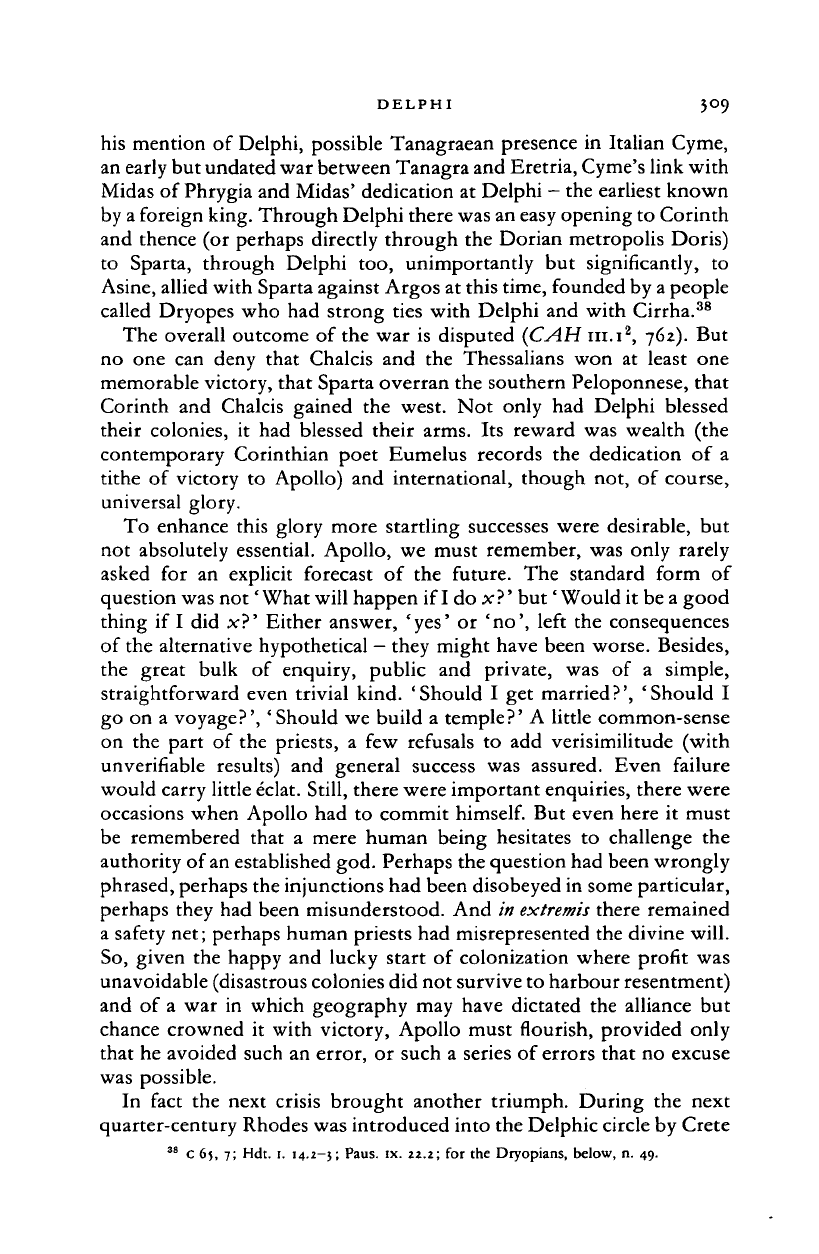
DELPHI
309
his mention of Delphi, possible Tanagraean presence in Italian Cyme,
an early but undated war between Tanagra and Eretria, Cyme's link with
Midas of Phrygia and Midas' dedication at Delphi - the earliest known
by
a
foreign king. Through Delphi there was an easy opening to Corinth
and thence (or perhaps directly through the Dorian metropolis Doris)
to Sparta, through Delphi too, unimportantly but significantly, to
Asine, allied with Sparta against Argos at this time, founded by a people
called Dryopes who had strong ties with Delphi and with Cirrha.
38
The overall outcome of the war is disputed (CAH
III.I
2
,
762). But
no one can deny that Chalcis and the Thessalians won at least one
memorable victory, that Sparta overran the southern Peloponnese, that
Corinth and Chalcis gained the west. Not only had Delphi blessed
their colonies, it had blessed their arms. Its reward was wealth (the
contemporary Corinthian poet Eumelus records the dedication of a
tithe of victory to Apollo) and international, though not, of course,
universal glory.
To enhance this glory more startling successes were desirable, but
not absolutely essential. Apollo, we must remember, was only rarely
asked for an explicit forecast of the future. The standard form of
question was not 'What will happen if
I
do x?' but 'Would it be a good
thing if I did x?' Either answer, 'yes' or 'no', left the consequences
of the alternative hypothetical
—
they might have been worse. Besides,
the great bulk of enquiry, public and private, was of a simple,
straightforward even trivial kind. 'Should I get married?', 'Should I
go on a voyage?', 'Should we build a temple?' A little common-sense
on the part of the priests, a few refusals to add verisimilitude (with
unverifiable results) and general success was assured. Even failure
would carry little eclat. Still, there were important enquiries, there were
occasions when Apollo had to commit
himself.
But even here it must
be remembered that a mere human being hesitates to challenge the
authority of
an
established god. Perhaps the question had been wrongly
phrased, perhaps the injunctions had been disobeyed in some particular,
perhaps they had been misunderstood. And in
extremis
there remained
a safety net; perhaps human priests had misrepresented the divine will.
So,
given the happy and lucky start of colonization where profit was
unavoidable (disastrous colonies did not survive to harbour resentment)
and of a war in which geography may have dictated the alliance but
chance crowned it with victory, Apollo must flourish, provided only
that he avoided such an error, or such a series of errors that no excuse
was possible.
In fact the next crisis brought another triumph. During the next
quarter-century Rhodes was introduced into the Delphic circle by Crete
38
c 65, 7; Hdt. 1.
14.2-3;
Paus.
ix. J2.2; for the Dryopians, below, n. 49.
Cambridge Histories Online © Cambridge University Press, 2008
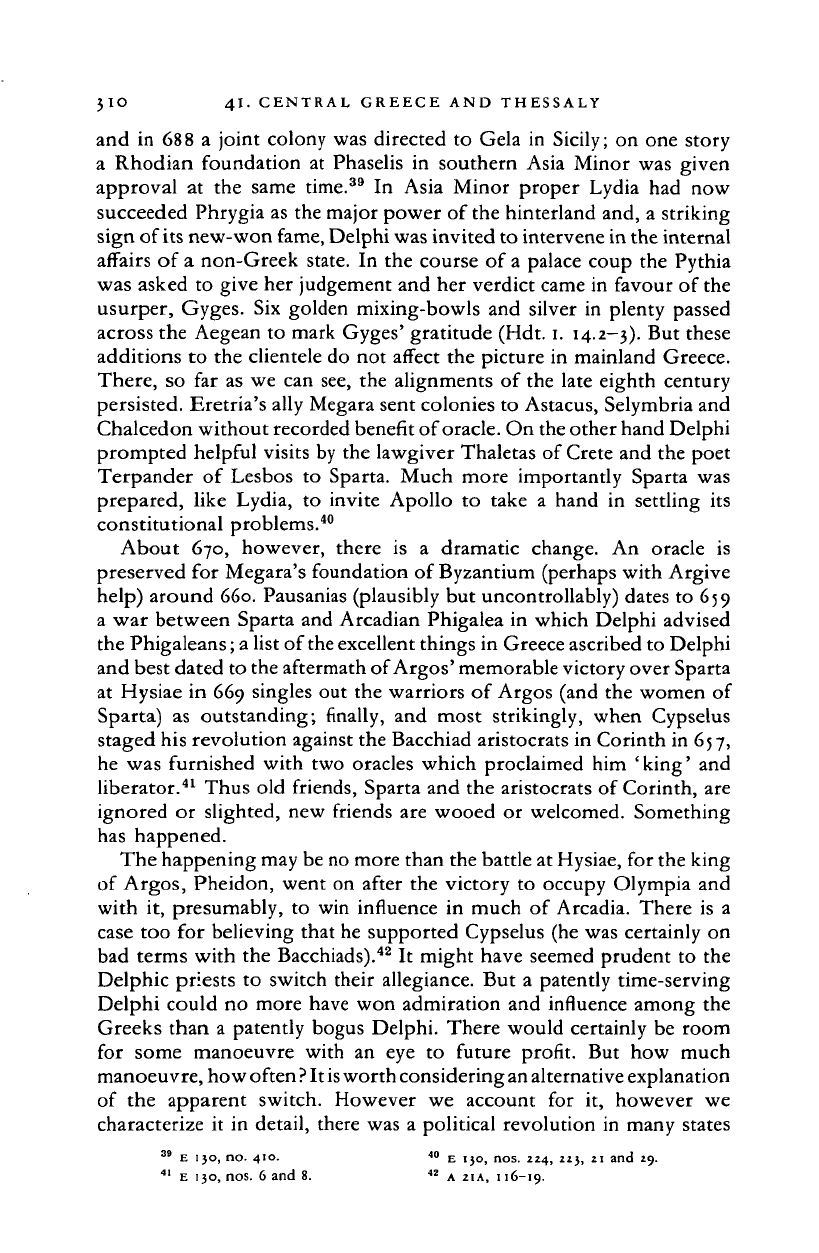
3IO 41- CENTRAL GREECE AND THESSALY
and in 688
a
joint colony was directed to Gela in Sicily; on one story
a Rhodian foundation
at
Phaselis
in
southern Asia Minor was given
approval
at
the same time.
39
In
Asia Minor proper Lydia had now
succeeded Phrygia as the major power of the hinterland and, a striking
sign of its new-won fame, Delphi was invited to intervene in the internal
affairs of a non-Greek state. In the course of a palace coup the Pythia
was asked to give her judgement and her verdict came in favour of the
usurper, Gyges. Six golden mixing-bowls and silver in plenty passed
across the Aegean to mark Gyges' gratitude (Hdt. i. 14.2-3). But these
additions to the clientele do not affect the picture in mainland Greece.
There, so far as we can see, the alignments of the late eighth century
persisted. Eretria's ally Megara sent colonies to Astacus, Selymbria and
Chalcedon without recorded benefit of oracle. On the other hand Delphi
prompted helpful visits by the lawgiver Thaletas of Crete and the poet
Terpander
of
Lesbos
to
Sparta. Much more importantly Sparta was
prepared, like Lydia,
to
invite Apollo
to
take
a
hand
in
settling
its
constitutional problems.
40
About 670, however, there
is a
dramatic change.
An
oracle
is
preserved for Megara's foundation of Byzantium (perhaps with Argive
help) around 660. Pausanias (plausibly but uncontrollably) dates to 659
a war between Sparta and Arcadian Phigalea in which Delphi advised
the Phigaleans; a list of
the
excellent things in Greece ascribed to Delphi
and best dated to the aftermath of Argos' memorable victory over Sparta
at Hysiae in 669 singles out the warriors of Argos (and the women of
Sparta)
as
outstanding; finally, and most strikingly, when Cypselus
staged his revolution against the Bacchiad aristocrats in Corinth in 657,
he was furnished with two oracles which proclaimed him 'king' and
liberator.
41
Thus old friends, Sparta and the aristocrats of Corinth, are
ignored
or
slighted, new friends are wooed or welcomed. Something
has happened.
The happening may be no more than the battle at Hysiae, for the king
of Argos, Pheidon, went on after the victory to occupy Olympia and
with it, presumably, to win influence
in
much
of
Arcadia. There is
a
case too for believing that he supported Cypselus (he was certainly on
bad terms with the Bacchiads).
42
It
might have seemed prudent to the
Delphic priests to switch their allegiance. But
a
patently time-serving
Delphi could no more have won admiration and influence among the
Greeks than a patently bogus Delphi. There would certainly be room
for some manoeuvre with
an
eye
to
future profit. But how much
manoeuvre, how often
?
It
is
worth considering
an
alternative explanation
of the apparent switch. However
we
account
for it,
however
we
characterize
it
in detail, there was a political revolution in many states
39
E
150, no. 410. •">
E
130, nos. 224, 223, 21 and 29.
41
E
130, nos.
6
and
8.
42
A 21A, 116-19.
Cambridge Histories Online © Cambridge University Press, 2008
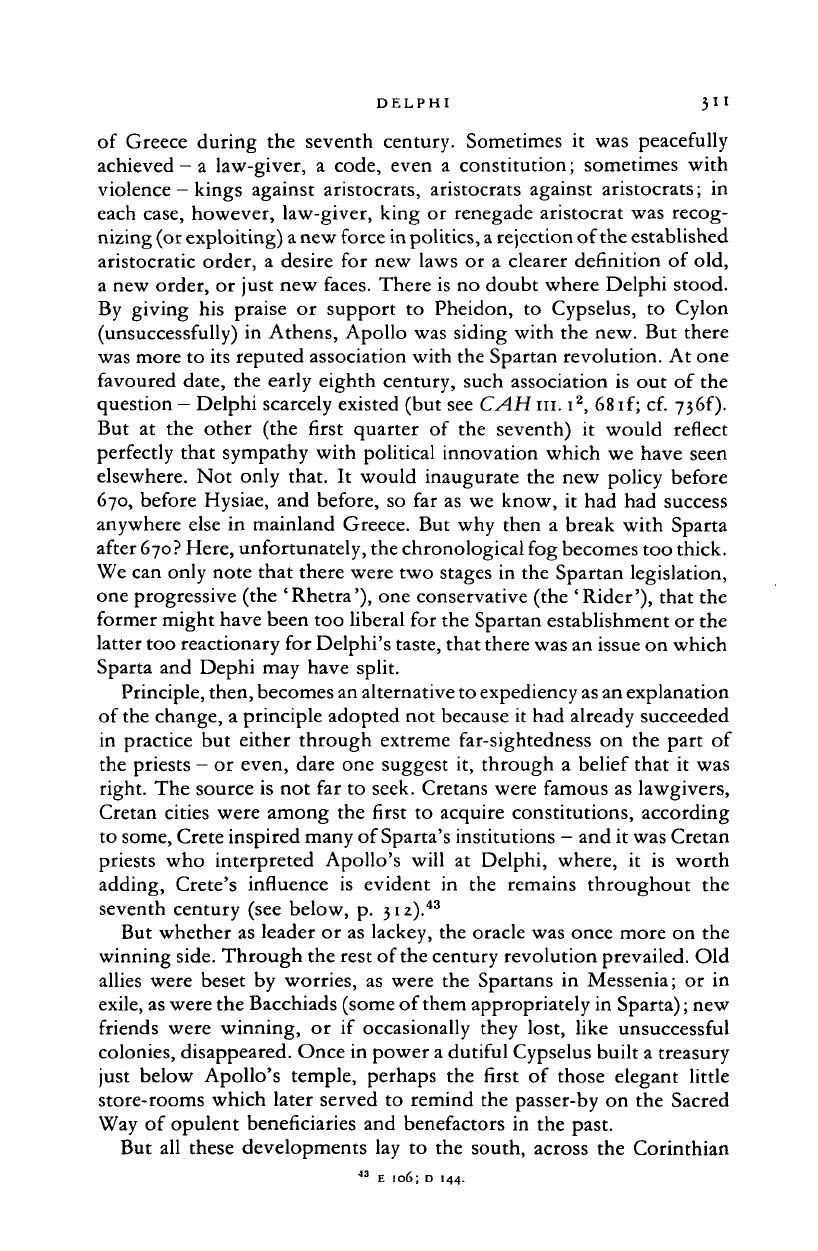
DELPHI 311
of Greece during the seventh century. Sometimes it was peacefully
achieved - a law-giver, a code, even a constitution; sometimes with
violence
—
kings against aristocrats, aristocrats against aristocrats; in
each case, however, law-giver, king or renegade aristocrat was recog-
nizing (or exploiting)
a
new force in
politics,
a
rejection of the established
aristocratic order, a desire for new laws or a clearer definition of old,
a new order, or just new faces. There is no doubt where Delphi stood.
By giving his praise or support to Pheidon, to Cypselus, to Cylon
(unsuccessfully) in Athens, Apollo was siding with the new. But there
was more to its reputed association with the Spartan revolution. At one
favoured date, the early eighth century, such association is out of the
question - Delphi scarcely existed (but see CAH in. i
2
,
68if;
cf. 736f).
But at the other (the first quarter of the seventh) it would reflect
perfectly that sympathy with political innovation which we have seen
elsewhere. Not only that. It would inaugurate the new policy before
670,
before Hysiae, and before, so far as we know, it had had success
anywhere else in mainland Greece. But why then a break with Sparta
after 670? Here, unfortunately, the chronological fog becomes too thick.
We can only note that there were two stages in the Spartan legislation,
one progressive (the 'Rhetra'), one conservative (the 'Rider'), that the
former might have been too liberal for the Spartan establishment or the
latter too reactionary for Delphi's taste, that there was an issue on which
Sparta and Dephi may have split.
Principle, then, becomes an alternative to expediency
as
an explanation
of
the
change, a principle adopted not because it had already succeeded
in practice but either through extreme far-sightedness on the part of
the priests - or even, dare one suggest it, through a belief that it was
right. The source is not far to seek. Cretans were famous as lawgivers,
Cretan cities were among the first to acquire constitutions, according
to some, Crete inspired many of Sparta's institutions
—
and it was Cretan
priests who interpreted Apollo's will at Delphi, where, it is worth
adding, Crete's influence is evident in the remains throughout the
seventh century (see below, p. 312).
43
But whether as leader or as lackey, the oracle was once more on the
winning side. Through the rest of the century revolution prevailed. Old
allies were beset by worries, as were the Spartans in Messenia; or in
exile, as were the Bacchiads (some of them appropriately in Sparta); new
friends were winning, or if occasionally they lost, like unsuccessful
colonies, disappeared. Once in power a dutiful Cypselus built a treasury
just below Apollo's temple, perhaps the first of those elegant little
store-rooms which later served to remind the passer-by on the Sacred
Way of opulent beneficiaries and benefactors in the past.
But all these developments lay to the south, across the Corinthian
13
E 106; D 144.
Cambridge Histories Online © Cambridge University Press, 2008
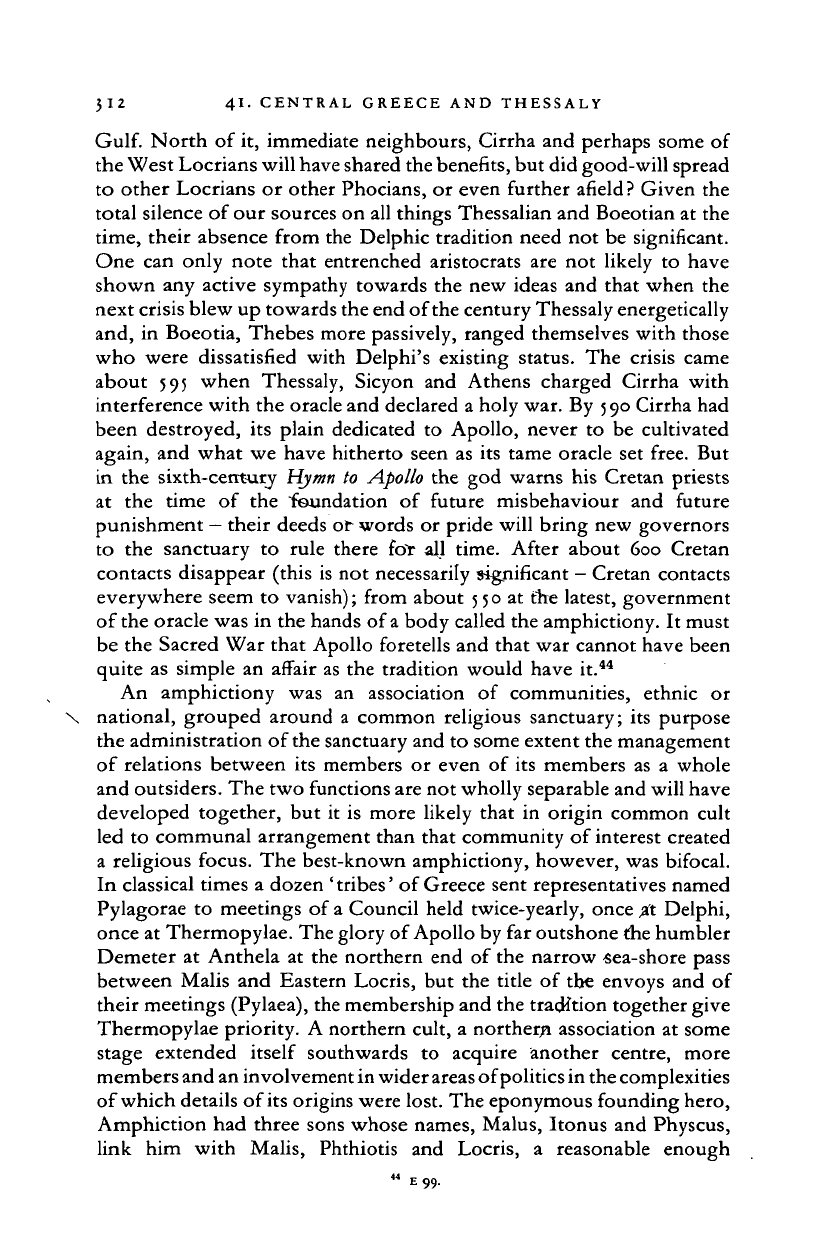
312 4
1
- CENTRAL GREECE AND THESSALY
Gulf.
North of it, immediate neighbours, Cirrha and perhaps some of
the West Locrians will have shared the benefits, but did good-will spread
to other Locrians or other Phocians, or even further afield
?
Given the
total silence of our sources on all things Thessalian and Boeotian at the
time,
their absence from the Delphic tradition need not be significant.
One can only note that entrenched aristocrats are not likely to have
shown any active sympathy towards the new ideas and that when the
next crisis blew up towards the end of the century Thessaly energetically
and, in Boeotia, Thebes more passively, ranged themselves with those
who were dissatisfied with Delphi's existing status. The crisis came
about 595 when Thessaly, Sicyon and Athens charged Cirrha with
interference with the oracle and declared a holy war. By
5 90
Cirrha had
been destroyed, its plain dedicated to Apollo, never to be cultivated
again, and what we have hitherto seen as its tame oracle set free. But
in the sixth-century Hymn to Apollo the god warns his Cretan priests
at the time of the foundation of future misbehaviour and future
punishment - their deeds or words or pride will bring new governors
to the sanctuary to rule there for all time. After about 600 Cretan
contacts disappear (this is not necessarily significant
—
Cretan contacts
everywhere seem to vanish); from about
5 5 o
at the latest, government
of the oracle was in the hands of a body called the amphictiony. It must
be the Sacred War that Apollo foretells and that war cannot have been
quite as simple an affair as the tradition would have it.
44
An amphictiony was an association of communities, ethnic or
\ national, grouped around a common religious sanctuary; its purpose
the administration of the sanctuary and to some extent the management
of relations between its members or even of its members as a whole
and outsiders. The two functions are not wholly separable and will have
developed together, but it is more likely that in origin common cult
led to communal arrangement than that community of interest created
a religious focus. The best-known amphictiony, however, was bifocal.
In classical times a dozen
'
tribes'
of Greece sent representatives named
Pylagorae to meetings of a Council held twice-yearly, once .at Delphi,
once at Thermopylae. The glory of Apollo by far outshone the humbler
Demeter at Anthela at the northern end of the narrow •sea-shore pass
between Malis and Eastern Locris, but the title of tbe envoys and of
their meetings (Pylaea), the membership and the tradition together give
Thermopylae priority. A northern cult, a northern association at some
stage extended itself southwards to acquire another centre, more
members and an involvement
in
wider
areas
of politics
in
the complexities
of which details of its origins were lost. The eponymous founding hero,
Amphiction had three sons whose names, Malus, Itonus and Physcus,
link him with Malis, Phthiotis and Locris, a reasonable enough
« E
99
.
Cambridge Histories Online © Cambridge University Press, 2008
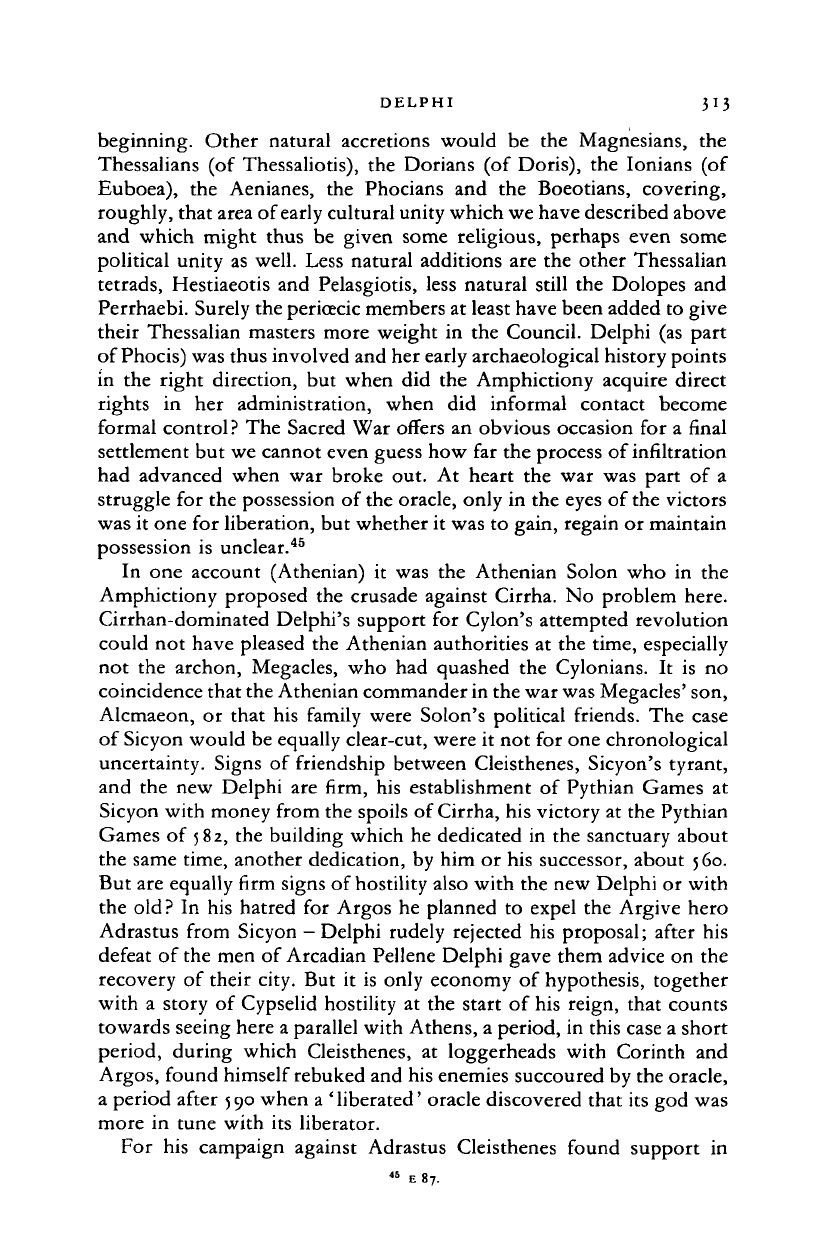
DELPHI 313
beginning. Other natural accretions would be the Magnesians, the
Thessalians (of Thessaliotis), the Dorians (of Doris), the Ionians (of
Euboea), the Aenianes, the Phocians and the Boeotians, covering,
roughly, that area of early cultural unity which we have described above
and which might thus be given some religious, perhaps even some
political unity as well. Less natural additions are the other Thessalian
tetrads, Hestiaeotis and Pelasgiotis, less natural still the Dolopes and
Perrhaebi. Surely the pericecic members at least have been added to give
their Thessalian masters more weight in the Council. Delphi (as part
of Phocis) was thus involved and her early archaeological history points
in the right direction, but when did the Amphictiony acquire direct
rights in her administration, when did informal contact become
formal control? The Sacred War offers an obvious occasion for a final
settlement but we cannot even guess how far the process of infiltration
had advanced when war broke out. At heart the war was part of a
struggle for the possession of the oracle, only in the eyes of the victors
was it one for liberation, but whether it was to gain, regain or maintain
possession is unclear.
45
In one account (Athenian) it was the Athenian Solon who in the
Amphictiony proposed the crusade against Cirrha. No problem here.
Cirrhan-dominated Delphi's support for Cylon's attempted revolution
could not have pleased the Athenian authorities at the time, especially
not the archon, Megacles, who had quashed the Cylonians. It is no
coincidence that the Athenian commander in the war
was
Megacles' son,
Alcmaeon, or that his family were Solon's political friends. The case
of Sicyon would be equally clear-cut, were it not for one chronological
uncertainty. Signs of friendship between Cleisthenes, Sicyon's tyrant,
and the new Delphi are firm, his establishment of Pythian Games at
Sicyon with money from the spoils of Cirrha, his victory at the Pythian
Games of 582, the building which he dedicated in the sanctuary about
the same time, another dedication, by him or his successor, about 560.
But are equally firm signs of hostility also with the new Delphi or with
the old? In his hatred for Argos he planned to expel the Argive hero
Adrastus from Sicyon -Delphi rudely rejected his proposal; after his
defeat of the men of Arcadian Pellene Delphi gave them advice on the
recovery of their city. But it is only economy of hypothesis, together
with a story of Cypselid hostility at the start of his reign, that counts
towards seeing here a parallel with Athens, a period, in this case a short
period, during which Cleisthenes, at loggerheads with Corinth and
Argos, found himself rebuked and his enemies succoured by the oracle,
a period after
5 90
when a ' liberated' oracle discovered that its god was
more in tune with its liberator.
For his campaign against Adrastus Cleisthenes found support in
4S
E 87.
Cambridge Histories Online © Cambridge University Press, 2008
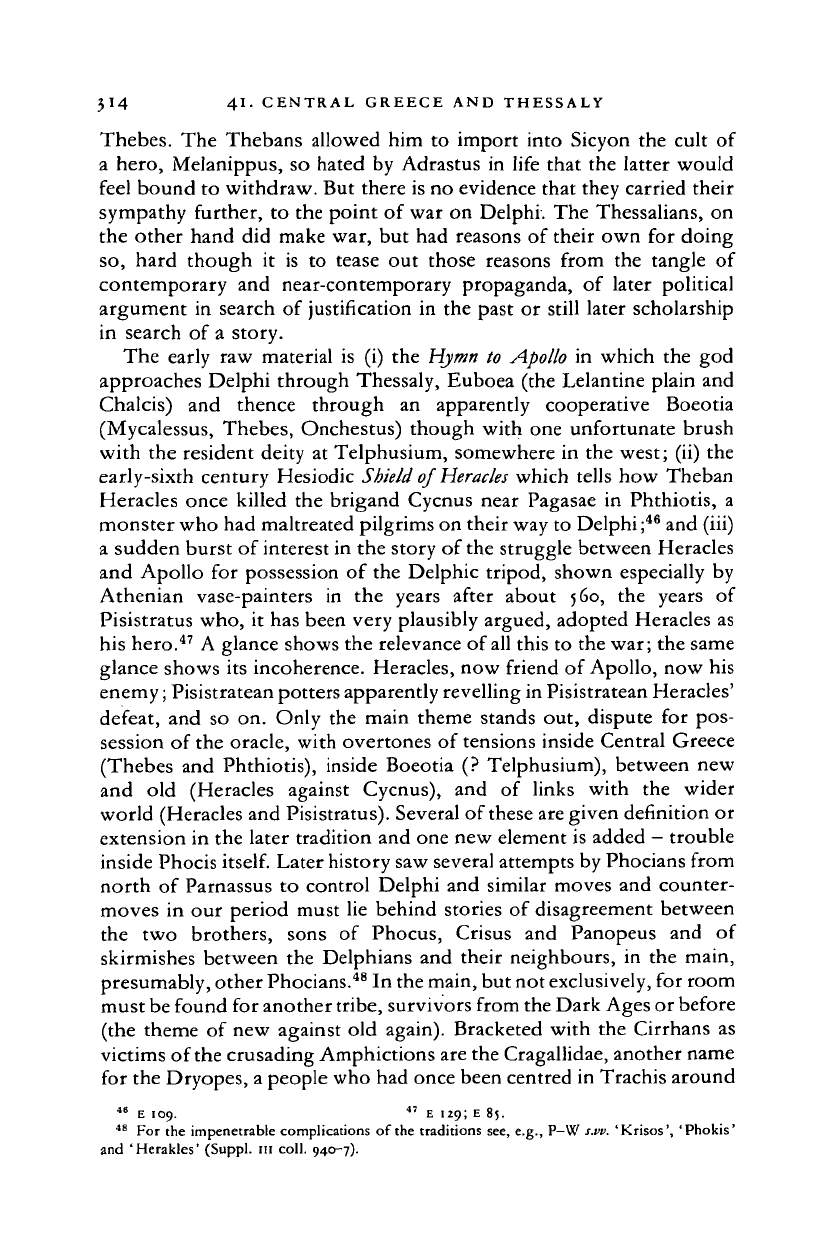
314 4
1
- CENTRAL GREECE AND THESSALY
Thebes. The Thebans allowed him to import into Sicyon the cult of
a hero, Melanippus, so hated by Adrastus in life that the latter would
feel bound to withdraw. But there is no evidence that they carried their
sympathy further, to the point of war on Delphi. The Thessalians, on
the other hand did make war, but had reasons of their own for doing
so,
hard though it is to tease out those reasons from the tangle of
contemporary and near-contemporary propaganda, of later political
argument in search of justification in the past or still later scholarship
in search of a story.
The early raw material is (i) the Hymn to Apollo in which the god
approaches Delphi through Thessaly, Euboea (the Lelantine plain and
Chalcis) and thence through an apparently cooperative Boeotia
(Mycalessus, Thebes, Onchestus) though with one unfortunate brush
with the resident deity at Telphusium, somewhere in the west; (ii) the
early-sixth century Hesiodic
Shield
of
Heracles
which tells how Theban
Heracles once killed the brigand Cycnus near Pagasae in Phthiotis, a
monster who had maltreated pilgrims on their way to Delphi;
46
and (iii)
a sudden burst of interest in the story of the struggle between Heracles
and Apollo for possession of the Delphic tripod, shown especially by
Athenian vase-painters in the years after about 560, the years of
Pisistratus who, it has been very plausibly argued, adopted Heracles as
his hero.
47
A glance shows the relevance of
all
this to the war; the same
glance shows its incoherence. Heracles, now friend of Apollo, now his
enemy; Pisistratean potters apparently revelling in Pisistratean Heracles'
defeat, and so on. Only the main theme stands out, dispute for pos-
session of the oracle, with overtones of tensions inside Central Greece
(Thebes and Phthiotis), inside Boeotia (? Telphusium), between new
and old (Heracles against Cycnus), and of links with the wider
world (Heracles and Pisistratus). Several of these are given definition or
extension in the later tradition and one new element is added - trouble
inside Phocis
itself.
Later history saw several attempts by Phocians from
north of Parnassus to control Delphi and similar moves and counter-
moves in our period must lie behind stories of disagreement between
the two brothers, sons of Phocus, Crisus and Panopeus and of
skirmishes between the Delphians and their neighbours, in the main,
presumably, other Phocians.
48
In the main, but not exclusively, for room
must be found for another
tribe,
survivors from the Dark Ages or before
(the theme of new against old again). Bracketed with the Cirrhans as
victims of the crusading Amphictions are the Cragallidae, another name
for the Dryopes, a people who had once been centred in Trachis around
48
E IO9.
"
E 129; E
85.
48
For the impenetrable complications of the traditions see, e.g., P-W
s.vv.
'Krisos', 'Phokis'
and 'Herakles' (Suppl. m coll. 940-7).
Cambridge Histories Online © Cambridge University Press, 2008
